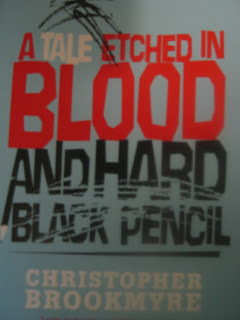I'm almost done planning
Polaroid, and it's not a good feeling. I want to keep working on it, I know I'm not ready to start writing it (and hey. It's October), but I don't know quite what's left to get on with.
For various reasons (over at the NaNo site) I've written a synopsis, a plot outline, and a one-sentence summary. And even though all of those were simply summaries of information I'd already got in bulletpoint form, writing them really helped. I'm still getting to know the novel, it turns out. And talking about something is a lot easier than thinking about something.
You know what's coming. All this means I will now talk about the thing, all over again. Rather than trying to reduce the whole mess into an intriguing and sensical blog post, I'm going to dig up that watery, curious skeleton, Michael Owen. Ask me questions, Michael, and I shall answer.
MO: Why is it called Polaroid? Are you sure you're writing a novel, not a photograph?
I'm fairly sure it's not a photograph. It's called
Polaroid because... Well, it's not completely clear.
There is a Polaroid camera that plays some role in the plot, and a particular Polaroid photo that plays a bigger role. It all kicks off from there, in a way. There might also be something semi-deep about instants in time that take time to develop/show themselves, and the phrase 'a snapshot of youth' may dirty my lips when I'm feeling outrageously uncreative.
The main character, David, is a portrait artist, and he is obssessed with capturing peoples likenesses. Grab your wax crayons and colour that fact relevant.
MO: So it's all about David? He's the main character?
I think he's the main guy, but there's a cast of four who are pretty central. David has the extra edge, in that a lot of the story is told through his eyes. His is the only true instance of first person narration.
There's Fenton, who the book might be said to be more truly about. He's David's oldest friend, and is a bit of a dick. Parts of the story are told through his journal entries.
There's Charlotte, who is also, somehow, the centre of the novel. We hear from her through intermittent blog posts. The key triggering event (remember that Polaroid photo?) involves her centrally, and the climax of the novel involves her centrally. I guess I would say she is somehow central.
There's Sam, who isn't even around for the most part. We hear his thoughts through the letters he sends the others, most often to Charlotte. He gives us something of an outside perpective on things, but he is neck deep in the same issues at his end, too. And by the end, he's right back where it counts, everything intermingles, and he gets a letter that is necessary and sufficient for the final clincher.
MO: That answer was too long. If I was on a payphone... That's all I'm saying.
You're not on a payphone, Michael, I can see you sitting right in front of me. And you're on a landline.
MO: Nobody thinks you're clever, Ben. One last question: what's the releveance of all this 'dressing up as zombies' talk I hear you talking about?
I wish you hadn't asked that. Like the old Polaroid factor, this got into the novel in the early days, when I was just chucking in things I liked the sound of. And now it's too deeply caught up in events to let go. I don't
want to let it go, either. It gives trhe novel a little bit of character, something to stop it sounding like EastEnders.
The gang all dress up as the undead, and spend an afternoon mime-stalking people through the city centre. It's a fun, harmless, and ill-thought-out (BLAME THE CHARACTERS, BEN) prank, before they all go separate ways after the summer. It's meant to draw them together, but the after-party gets messy. There's fallout.
These guys all have a desperate desire to belong -- they're at that age -- but not much competence in that field. It's about the lengths people will go to to feel part of a group, and how much they are willing to change themselves. David, the least belongy, is also the least comfortable with this.
The fallout from the first zombie dress-up splits the group. Rather than finding new places to belong on the back of the confidence they got from having a great base group of friends, they scatter, disperse, and generally fail to take root anywhere. (As I write, I'm wondering if I should somehow smuggle this metaphor directly into the novel, too.)
The second zombie dress-up is a desperate attempt by Fenton, who suffered most from the fallout of the first, to get the band back together. He wants to rescue that feeling of being part of the group, and he wants to fix a lot of things he has caused to break. But this time, the fallout is a lot worse.
MO: That sounds like a weirdly unarced narrative.
I was just thinking that. But it works, honestly. There's going to be more going on in the book. The problem of belonging isn't going to be fixed by dressing up, and rewinding to the point when everything went wrong isn't the same as taking responsibility for your actions. It might turn out that shared responisibility is what brings people together and makes them belong, without giving away too much.
That's me thinking aloud. I would love to hear anyones reactions to any idea I've mumbled across here. I'd much rather hear a criticism now, than when I've written 80k and spent all my savings on a two-page spread in the
TLS.
























